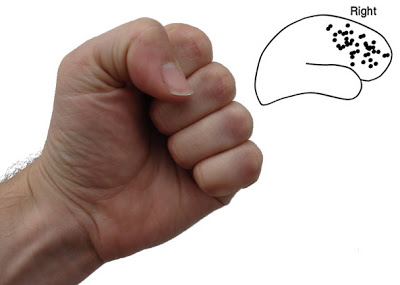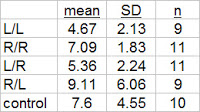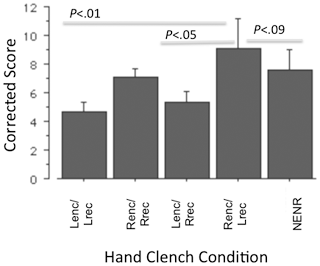Neuroscience

You might have seen this news story the other day:
Sounds too easy now, doesn't it? And if you're exclaiming, "that's just too good to be true!" — then you'd be correct.
The new study by Propper et al. (2013) has unleashed a torrent of criticism on Twitter, including this starter by @js_simons.

What motivated such a study in the first place? I'll try to run through the authors' rationale here, starting with statements from the abstract, which are followed by my commentary.
The HERA model was revisited and confirmed by its proponents using fMRI data (Habib et al., 2003), but the evidence against it was considerable (Owen, 2003). The general consensus is that HERA has been discredited. In fact, noted memory researcher Dr. Jon Simons posted a comment at the PLOS ONE website explaining why the underlying hypothesis of Propper et al. is problematic (among other issues).
In the experiment, participants studied a list of 36 words, engaged in a filler task, and then recalled as many words as possible. Approximately 10 subjects participated in each of 16 conditions, only five of which are reported in the paper. These involved squeezing a small pink ball in one hand (2 sets of 45 sec) before the encoding and the retrieval phases of the study. The control condition did not involve clenching, but the participants held a small pink ball in each hand.2
The five conditions are shown below, named by the hand used during encoding/retrieval. You'll notice that the number of participants in each group (n) is pretty small. I calculated standard deviations from the standard error values to determine effect sizes using this effect size calculator. 3

Although the authors reported the total number of words written down (correct or not) and the number of correct words in Figs. 1 and 2 respectively, the important result is shown in Fig. 3, which takes into account the false alarms, or incorrectly recalled words.

Figure 3 (Propper et al., 2013). Corrected scores as a function of hand clench condition. [NOTE: NENR = None Encoding/None Recall, or control.]
The one-way ANOVA for this comparison "did not reach traditional significance" (p=.08), but two of the post hoc comparisons did (uncorrected for multiple comparisons involving 16 groups). The p<.09 bar in the figure is in the wrong place. Below is a table I made using the effect size calculator (ESC) for Cohen's d, compared to what was reported in the paper.

The key HERA condition (R/L) did not differ from the control condition, so the predicted hand clenching improvement in memory did not materialize. The superiority of R/L over the other two clenching configurations was due to worse performance in the latter. In other words, if you squeeze a ball with your left hand before encoding, you'll do worse than if you didn't (all statistical objections aside) — and the L clenching before retrieval didn't help. The authors stated otherwise, however:
The difference between the two rightmost bars in Fig. 3 above is not terribly close to being significant (as far as I can tell), so the major hypothesis was not supported here.
Clench Your Fist to Get a Grip on Memory? I don't think so.
ADDENDUM (May 1, 2013): An Erratum to Figure 3 has been posted in the Comments section of the PLOS ONE article. It might have been in response to my comment in a previous thread, but this comment wasn't addressed directly.
ADDENDUM #2 (May 5, 2013): There has been a formal correction to Figure 3, which can be downloaded here (as a TIF). This doesn't affect any of the other points I made in this post, which were never addressed.
Footnotes
1 The fist-clenching activation of motor cortex is supposed to spread to dorsolateral prefrontal cortex, or so it goes (Harmon-Jones, 2006).
2 @neuromusic noted that the authors measured ear temperatures: "Immediately following pre-clenching condition, participants’ ear temperatures were taken (to be reported elsewhere)..." This sounded a little bizarre, but I found this publication by Propper and Brunyé, Lateralized difference in tympanic membrane temperature: emotion and hemispheric activity, which must explain the concept.
3 @rogierK thought the reported effect sizes were way too large.
References
Habib R, Nyberg L, Tulving E. (2003). Hemispheric asymmetries of memory: the HERA model revisited. Trends Cogn Sci. 7(6):241-245.
Harmon-Jones E. (2006), Unilateral right-hand contractions cause contralateral alpha power suppression and approach motivational affective experience. Psychophysiology 43(6):598-603.
Owen AM. (2003). HERA today, gone tomorrow? Trends Cogn Sci. 7(9):383-384.
Propper, R., McGraw, S., Brunyé, T., & Weiss, M. (2013). Getting a Grip on Memory: Unilateral Hand Clenching Alters Episodic Recall PLoS ONE, 8 (4) DOI: 10.1371/journal.pone.0062474
Tulving E, Kapur S, Craik FI, Moscovitch M, & Houle S (1994). Hemispheric encoding/retrieval asymmetry in episodic memory: positron emission tomography findings. Proceedings of the National Academy of Sciences of the United States of America, 91 (6), 2016-20 PMID: 8134342
- Simple Fist-squeezing Procedure Helps Athletes Avoid Choking Under Pressure
The next time you're faced with a high-pressure situation in sport, try squeezing your left fist tight for thirty seconds. According to a team of German sports psychologists, doing so will activate your right hemisphere, aiding automatic, skilled...
- We Become More Ambidextrous As We Get Older
We’re unaware of it, but starting in middle-age, our dominant hand gradually loses its superiority, so that we become, in a sense, more ambidextrous as we get older. Tobias Kalisch and colleagues recruited 60 participants who were all strongly right-handed...
- I Suggest... Neuroimaging Studies Of Hypnosis
Now back to our irregularly scheduled neuroscience programming! There's a series of in press articles about hypnosis in the Journal of Physiology (Paris). I'll take a look and report back. Functional neuroanatomy of the hypnotic state In...
- Neuropsychology Abstract Of The Day: Parietal Function
Haramati S, Soroker N, Dudai Y, & Levy DA. The posterior parietal cortex in recognition memory: A neuropsychological study. Neuropsychologia. 2007 Nov 29 [Epub ahead of print] Department of Neurobiology, Weizmann Institute of Science, P.O. Box 26, Rehovot...
- Neuropsychology Abstract Of The Day: Alzheimer's Disease (ad), Fmri, And Cognition
Diamond EL, Miller S, Dickerson BC, Atri A, Depeau K, Fenstermacher E, Pihlajamäki M, Celone K, Salisbury S, Gregas M, Rentz D, & Sperling RA. Relationship of fMRI activation to clinical trial memory measures in Alzheimer disease. Neurology. 2007 Sep...
Neuroscience
Want to remember something? Clenching your fist doesn't help!

Image Credits: fist and brain.
You might have seen this news story the other day:
Want to remember something? Clench your fists!
Giving a speech and need to remember what to say? Just clench your right fist while rehearsing. Then, when it's time to give the speech, clench your left fist, and voila, you’ll recall what you rehearsed! That's what a new study found, which was published April 24 online at PLOS ONE.
Sounds too easy now, doesn't it? And if you're exclaiming, "that's just too good to be true!" — then you'd be correct.
The new study by Propper et al. (2013) has unleashed a torrent of criticism on Twitter, including this starter by @js_simons.

What motivated such a study in the first place? I'll try to run through the authors' rationale here, starting with statements from the abstract, which are followed by my commentary.
- Unilateral hand clenching increases neuronal activity in the frontal lobe of the contralateral hemisphere.
- Such hand clenching is also associated with increased experiencing of a given hemisphere’s “mode of processing.”
- Together, these findings suggest that unilateral hand clenching can be used to test hypotheses concerning the specializations of the cerebral hemispheres during memory encoding and retrieval.
- We investigated this possibility by testing effects of unilateral hand clenching on episodic memory. The hemispheric Encoding/Retrieval Asymmetry (HERA) model proposes left prefrontal regions are associated with encoding, and right prefrontal regions with retrieval, of episodic memories.
The HERA model was revisited and confirmed by its proponents using fMRI data (Habib et al., 2003), but the evidence against it was considerable (Owen, 2003). The general consensus is that HERA has been discredited. In fact, noted memory researcher Dr. Jon Simons posted a comment at the PLOS ONE website explaining why the underlying hypothesis of Propper et al. is problematic (among other issues).
- It was hypothesized that right hand clenching (left hemisphere activation) pre-encoding, and left hand clenching (right hemisphere activation) pre-recall, would result in superior memory.
- Results supported the HERA model.
In the experiment, participants studied a list of 36 words, engaged in a filler task, and then recalled as many words as possible. Approximately 10 subjects participated in each of 16 conditions, only five of which are reported in the paper. These involved squeezing a small pink ball in one hand (2 sets of 45 sec) before the encoding and the retrieval phases of the study. The control condition did not involve clenching, but the participants held a small pink ball in each hand.2
The five conditions are shown below, named by the hand used during encoding/retrieval. You'll notice that the number of participants in each group (n) is pretty small. I calculated standard deviations from the standard error values to determine effect sizes using this effect size calculator. 3

Although the authors reported the total number of words written down (correct or not) and the number of correct words in Figs. 1 and 2 respectively, the important result is shown in Fig. 3, which takes into account the false alarms, or incorrectly recalled words.

Figure 3 (Propper et al., 2013). Corrected scores as a function of hand clench condition. [NOTE: NENR = None Encoding/None Recall, or control.]
The one-way ANOVA for this comparison "did not reach traditional significance" (p=.08), but two of the post hoc comparisons did (uncorrected for multiple comparisons involving 16 groups). The p<.09 bar in the figure is in the wrong place. Below is a table I made using the effect size calculator (ESC) for Cohen's d, compared to what was reported in the paper.

The key HERA condition (R/L) did not differ from the control condition, so the predicted hand clenching improvement in memory did not materialize. The superiority of R/L over the other two clenching configurations was due to worse performance in the latter. In other words, if you squeeze a ball with your left hand before encoding, you'll do worse than if you didn't (all statistical objections aside) — and the L clenching before retrieval didn't help. The authors stated otherwise, however:
Individuals who encoded language-based information immediately following right hand clenching (left hemisphere activation), and recalled such information immediately following left hand clenching (right hemisphere activation), demonstrated superior episodic memory compared to the other hand clenching conditions. It is noteworthy that this condition was also superior to the no hand clenching control condition, though not significantly so.
The difference between the two rightmost bars in Fig. 3 above is not terribly close to being significant (as far as I can tell), so the major hypothesis was not supported here.
Clench Your Fist to Get a Grip on Memory? I don't think so.
Thanks to blog commenter Lew for first pointing out this study.
ADDENDUM (May 1, 2013): An Erratum to Figure 3 has been posted in the Comments section of the PLOS ONE article. It might have been in response to my comment in a previous thread, but this comment wasn't addressed directly.
ADDENDUM #2 (May 5, 2013): There has been a formal correction to Figure 3, which can be downloaded here (as a TIF). This doesn't affect any of the other points I made in this post, which were never addressed.
Footnotes
1 The fist-clenching activation of motor cortex is supposed to spread to dorsolateral prefrontal cortex, or so it goes (Harmon-Jones, 2006).
2 @neuromusic noted that the authors measured ear temperatures: "Immediately following pre-clenching condition, participants’ ear temperatures were taken (to be reported elsewhere)..." This sounded a little bizarre, but I found this publication by Propper and Brunyé, Lateralized difference in tympanic membrane temperature: emotion and hemispheric activity, which must explain the concept.
3 @rogierK thought the reported effect sizes were way too large.
References
Habib R, Nyberg L, Tulving E. (2003). Hemispheric asymmetries of memory: the HERA model revisited. Trends Cogn Sci. 7(6):241-245.
Harmon-Jones E. (2006), Unilateral right-hand contractions cause contralateral alpha power suppression and approach motivational affective experience. Psychophysiology 43(6):598-603.
Owen AM. (2003). HERA today, gone tomorrow? Trends Cogn Sci. 7(9):383-384.
Propper, R., McGraw, S., Brunyé, T., & Weiss, M. (2013). Getting a Grip on Memory: Unilateral Hand Clenching Alters Episodic Recall PLoS ONE, 8 (4) DOI: 10.1371/journal.pone.0062474
Tulving E, Kapur S, Craik FI, Moscovitch M, & Houle S (1994). Hemispheric encoding/retrieval asymmetry in episodic memory: positron emission tomography findings. Proceedings of the National Academy of Sciences of the United States of America, 91 (6), 2016-20 PMID: 8134342
- Simple Fist-squeezing Procedure Helps Athletes Avoid Choking Under Pressure
The next time you're faced with a high-pressure situation in sport, try squeezing your left fist tight for thirty seconds. According to a team of German sports psychologists, doing so will activate your right hemisphere, aiding automatic, skilled...
- We Become More Ambidextrous As We Get Older
We’re unaware of it, but starting in middle-age, our dominant hand gradually loses its superiority, so that we become, in a sense, more ambidextrous as we get older. Tobias Kalisch and colleagues recruited 60 participants who were all strongly right-handed...
- I Suggest... Neuroimaging Studies Of Hypnosis
Now back to our irregularly scheduled neuroscience programming! There's a series of in press articles about hypnosis in the Journal of Physiology (Paris). I'll take a look and report back. Functional neuroanatomy of the hypnotic state In...
- Neuropsychology Abstract Of The Day: Parietal Function
Haramati S, Soroker N, Dudai Y, & Levy DA. The posterior parietal cortex in recognition memory: A neuropsychological study. Neuropsychologia. 2007 Nov 29 [Epub ahead of print] Department of Neurobiology, Weizmann Institute of Science, P.O. Box 26, Rehovot...
- Neuropsychology Abstract Of The Day: Alzheimer's Disease (ad), Fmri, And Cognition
Diamond EL, Miller S, Dickerson BC, Atri A, Depeau K, Fenstermacher E, Pihlajamäki M, Celone K, Salisbury S, Gregas M, Rentz D, & Sperling RA. Relationship of fMRI activation to clinical trial memory measures in Alzheimer disease. Neurology. 2007 Sep...
